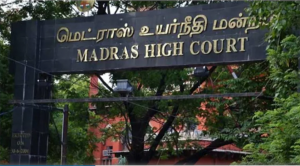 The Hon’ble High Court of Madras vide its order dated 15.06.2022 in the matter of M/s Interplex Electronics India Pvt. Ltd. Vs. The Assistant Commissioner of State Taxes Sriperumbudur Division, The Good and Service Tax Network in W.P.No.4458 of 2019 And W.M.P.No.5032 of 2019, held that timeline for filing TRAN – 1 return and revising it cannot be identical. The time line for revising must be a period over and above the timeline for filing TRAN -1.
The Hon’ble High Court of Madras vide its order dated 15.06.2022 in the matter of M/s Interplex Electronics India Pvt. Ltd. Vs. The Assistant Commissioner of State Taxes Sriperumbudur Division, The Good and Service Tax Network in W.P.No.4458 of 2019 And W.M.P.No.5032 of 2019, held that timeline for filing TRAN – 1 return and revising it cannot be identical. The time line for revising must be a period over and above the timeline for filing TRAN -1.
The Petitioner file the writ petition before the Hon’ble High Court seeking directions to the respondents to credit the amount pertaining to Input Tax Credit amounting to Rs. 16,21,227/- and Rs.4,24,136/- to the electronic credit ledger of the petitioner.
Petitioner’s Submissions: –
- It was submitted on the behalf of the petitioner that the petitioner is registered under Central Excise w.e.f. 2007, which later on was subsumed in the Goods and Service Tax Law.
- That in terms of Section 140 of the CGST Act, 2017, the petitioner was entitled to transition of ITC, and claimed the ITC amounting to Rs. 16,21,227/- and Rs.4,24,136/- as per proviso to Section 140(1), being the closing balance of CENVAT credit standing in their returns in June 2017 and for Service Tax for the period April to June, 2017.
- That Rule 117 of CGST Rules, 2017, fixed a time limit for availing credit through transition and the registered person who claimed transition of credit in terms of Section 140, was required to file a TRAN – 1 withing 90 days from 01.07.2017 i.e., 21.09.2017.
- Later, the time limit was extended due to various reasons from 29.09.2017 to 31.10.2017 vide order No. 2/2017 dated 18.09.2017, up to 30.11.2017 vide order No. 7/2017 dated 28.10.2017 and thereafter up to 27.12.2017 vide order No.10/2017 dated 15.11.2017.
- At the same time, Rule 120A provided for time limit form revising TRAN – 1, however, did not provide for a time line to revise and stated that it would be according to timeline set out under Rule 117. Thus, the extension of timeline for filing of TRAN – 1 under Rule 117 equally applied to revision of it, and consequently, the timeline for filing and revision of TRAN – 1 ended on 27.12.2017 as provided under order No. 10/2017 dated 15.11.2017.
- The petitioner filed TRAN – 1 on 27.12.2017 claiming transition of CENVAT credit, however, made an error in entering the amount, which was mentioned as Rs. 76,395/- instead of Rs. 16,21,227/-. Further, CENVAT credit amounting to Rs. 4,24,136/- erroneously was not mentioned or included at all. These two errors were noticed in the original TRAN -1 filed.
- Thereafter, the petitioner on 28.12.2018 made representation before the respondent authority, explaining the errors and sought permission for availment of credit, to which it was entitled but no response was received. Being aggrieved the petitioner has filed the Writ petition.
- That placing reliance on the Division Bench decision of this court in the case of Commissioner of GST & C. Ex., Chennai South Vs. Bharat Electronics Ltd., [(2022) 58 GSTL 514], it was submitted that it cannot be intention of the legislature that the assessee filing the TRAN – 1 on the last date, can have no recourse or time to seek revision of the same.
- Reliance was placed on Amplexor India Pvt. Ltd. Vs. Union of India, wherein the retrospective amendments to Rule 117 of the CGST Rules and CGST Sections have been challenged, and it was submitted that the same bench passed the order in R. Mani Electronics (supra) and the question that time limit prescribed under Rule 117 of the CGST rules was mandatory or directory is pending before the Larger Bench.
- Later reliance was placed on the decision of Brand Equity Treaties Ltd. Vs. Union of India and Others, [(2020 38 GSTL 10], wherein prayer was made seeking permission to transition accumulated CENVAT Credit and extension of timelines for availment of Credit. The Hon’ble Court after considering the circumstances, issued directions to the respondent to permit availment of credit within the extended timelines granted by the Court. Further an observation was made that ‘transition for itself does not create any benefit in favour of the petitioner except to carry forward accumulated credits, the eligibility to which will be tested at a later point in time’.
Respondents’ Submissions: –
- That on the behalf of the respondents, reliance was placed on the decision of R.Mani Electronics Vs. Union of India, [(2020) 39 GSTL 3], to submit that the time limit for availment of credit by transition is mandatory and not directory.
- It was submitted that the only recourse available to the petitioner is to challenge Rule 120A and in absence of such challenge, relief sought by the petitioner cannot be granted.
- Reliance was placed on the judgment of Hon’ble Supreme Court in Union of India Vs. Bharti Airtel Ltd. and others – (2022) 4 SCC 328, reversing the decision of Delhi High Court in Bharti Airtel Ltd. Vs. Union of India (38 GSTL 145) to submit that the timelines under the CGST Act and Rules cannot be breached under any circumstances. Though the decision is dealing with the amendment of a 3B return, the ratio of the decision in Bharti Airtel would apply to the present case.
Held: –
- The Hon’ble Court after considering the submissions made and facts of the case, found that the issue involved in the matter is different from the issue involved in the judgments referred by revenue.
- It was found that admittedly, the timelines for seeking transition of credit have been held as mandatory in R. Mani Electronics (supra), however, in the subsequent decision in Amplexor (supra), various judgments were referred by the counsels appearing from both sides and the Bench was persuaded to formulate certain issues for resolution, including the issue as to whether the timelines under Section 140 and 117 are mandator or directory in nature, and the same is pending for decision.
- Further the Hon’ble Supreme Court clarified the timelines with respect to GSTR returns, which may not lead to adverse conclusion against the assessee in the present case.
- It was found by the Hon’ble Court that distinction in the present matter is, the issue involved in the matter is regarding end date/cut-off date, one for seeking transition of credit and the other for seeking revision of error in the return seeking transition, can be one and the same.
- It was found by the Hon’ble Court that this bench dealt with a similar matter in Bharat Electronics (supra), and it was held that timeline for filing TRAN -1 cannot be same or identical to the timeline for revising. The purpose of the revision is to make corrections/modifications to the return of transition and the additional time, over and above the timeline granted for filing TRAN – 1 return be provided by the respondent.
- Thereafter, the Hon’ble Court disagreeing with the submission advanced on the behalf of the respondent that ‘Rule 120A should be challenged’, found that Rule 120A does not provide for any time limit and timeline provided under Rule 117 has to be considered for that purpose, however, this would not lead to a conclusion that the application of Rules 117 and 120A cannot be harmonized, to make them workable, viable and practical.
- Lastly, with the above, it was held by the Hon’ble Court that the timelines under Rule 120A must be of a period over and above the timelines provided under Rule 117, and the relief as sought by the petitioner was granted. Further as the credit filed by the petitioner pertains to Central Excise and Service Tax both coming under Central jurisdiction, the respondent authority was directed to open the portal for revision.
The Hon’ble Court with the above findings, allowed the writ petition with the directions to complete the exercise within 8 weeks from the date of uploading of the order on the Official Website.



